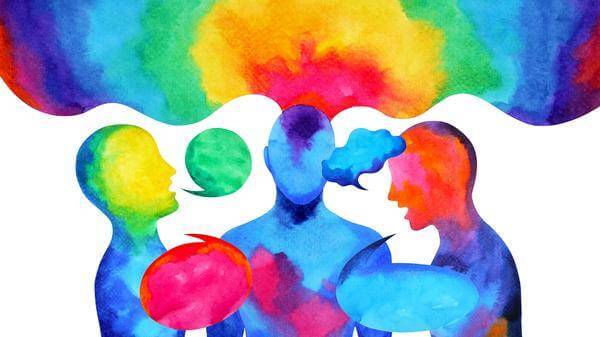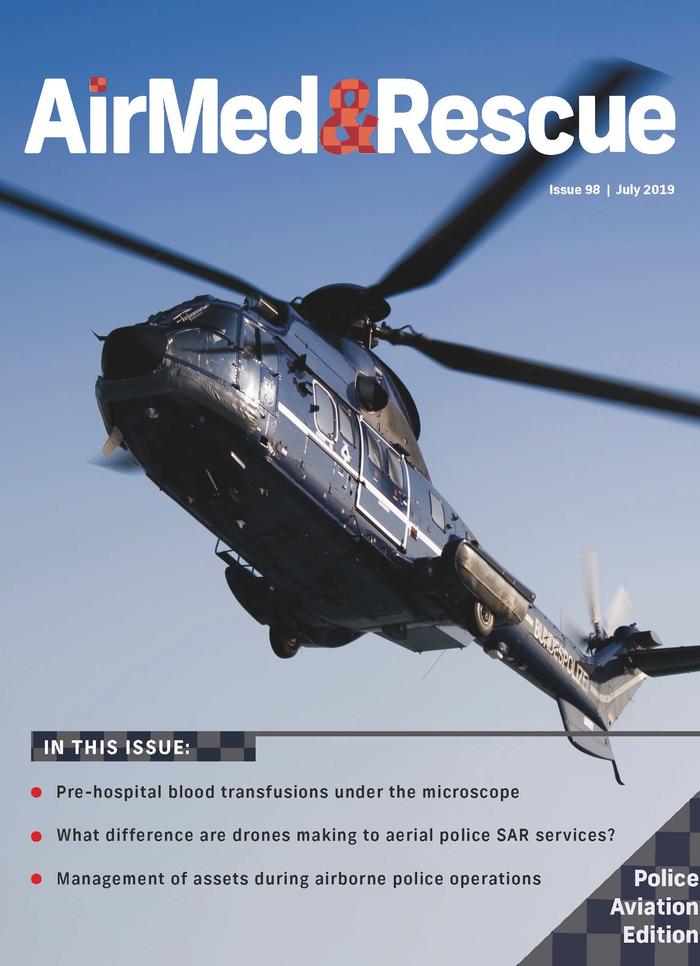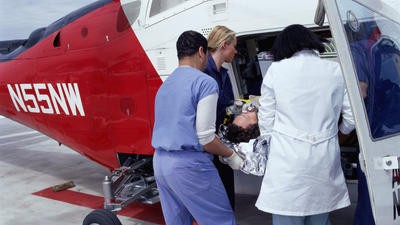Mental health training for SAR personnel and emergency services

Andy Elwood knows first-hand the mental strain that emergency services and SAR personnel are under, and the effect this can have on their wellbeing. His focus now lies on delivering training for mental health first aid courses
As a Search & Rescue (SAR) Paramedic, I have felt euphoria after risking my own life to save another. There is no other feeling like it, I love the adrenaline rush and the high afterwards, which often lasted for days on end. However, I have also felt the despair of arriving on scene at another suicide and having to recover a body by myself. I often wished I was able to help someone before they got to the stage of deciding to end their own life. Now I am in a position to do that.
I have left the best job I ever had, because I believe that I will save more lives through speaking, campaigning, and delivering Mental Health First Aid (MHFA) training than I would by dangling under a SAR helicopter as a paramedic. This was not an easy or quick decision, but one I felt compelled to make for myself and for others out there, especially men, who are three-times-more likely to die by suicide than women.
Like many people in pre-hospital care, I didn’t think about my own mental health for many years because I didn’t need to. I was fit and healthy and in my prime. I was going places, I never looked back and I had felt like I had it all. My only dealing with mental health was in a professional capacity, as a paramedic, treating patients.
However, after 20 years in emergency services, my personal experience is that talking has been an incredible help to me at critical points in my life. This has allowed me to share the burden of my worries and fears, gain another perspective, see a way forward and realise that I was just being human. This worked for me when I spoke to a psychiatrist after a traumatic incident that occured while performing SAR duties, talking to my wife on holiday when I had a flashback to Afghanistan, and to my GP last year, when I felt burnout from the cumulative build-up of life stressors since childhood. These mostly came from non-work inputs such as caring for elderly relatives, moving home, a new job with a promotion and running my own business in my spare time.
Primary triggers for mental ill health
Anyone can be affected by mental ill health. The World Health Organization (WHO) reports that depression is the leading cause of disability worldwide. Many symptoms of varying conditions are similar or shared, so let’s focus on depression for now.
It is estimated that 70 million working days are lost every year to mental health, costing Britain between £70 billion and £100 billion annually.1
Creating a culture where people feel confident to openly discuss their problems and trust their employer to support them is key to reducing sickness absence, staff turnover, and presenteeism, and will help staff flourish and thrive, improve morale and skills retention
Depression has no single cause and often involves a complex mix of factors from biological, psychological and social factors. Mental Health England list risk factors for depression as:
- Family history
- Persistent stress (working in emergency services?)
- Being a more sensitive person (caring professions as EMS or Paramedic?)
- Adverse childhood experiences
- Poverty and social disadvantage
- Recent adverse life events eg: being a victim of crime, death or serious illness in the family, having an accident, bullying or victimisation, separation or divorce
- Lack of a close confiding relationship
- Having a baby
This list shows a wide variety of factors and although some can be related to our work in emergency services, many are not. Work brings a lot of health benefits through offering a sense of purpose, fulfilment and being part of a team, especially in our line of work. However, mental illness is usually caused when pressures at work become more intense, coupled with factors outside work; for example, financial pressures, relationship problems, greater caring responsibilities from an ageing population etc. If the workplace is not supportive at this stage, then mental ill health can be triggered into common conditions of depression, anxiety or stress-related disorders.
Spotting the warning signs and talking at an early stage
Many of us may feel some of these feelings occasionally, and that is normal. However, when these feelings start to affect someone’s participation in everyday life or their ability to function safely at work, then we should reach out with support. Early signs are:
- Irritability, aggression, tearfulness,
- Inability to concentrate
- Increased consumption of caffeine, alcohol, cigarettes or sedatives
- Indecision
- Difficulty remembering things
- Loss of confidence
- Unplanned absences
- Increased errors / accidents
- Arguments / conflicts with others
- Negative changes to ways of working or socialising with colleagues, and
- Erratic or unacceptable behaviour.
#itsoktotalk
Although the responsibility for noticing changes in a person often rests with line managers, in our sphere of work, it is often a colleague who may notice these changes and can offer support in the first instance. Would you know what to do, how to start the conversation and what to say if your colleague shows these warning signs and decides to open up?
Actions for Organisations
Time to Change research2 found that 49 per cent of respondents would feel uncomfortable talking to their employer about their mental health, and in a BUPA poll, 94 per cent of business leaders admitted to prejudice against individuals with mental health issues in their organisations.3
Organisational culture can change for the better, as Mind Blue Light Programme4 recently highlighted, with these research key findings from their targeted support:
- Staff improved their mental health, resilience and confidence to seek support
- Managers and trainers had more confidence supporting staff in difficult situations
- Stigma and lack of awareness still exists, but is improving, and
- Sustained change requires practical investment, commitment, enthusiasm at all levels.
Most people’s mental health issues come from a combination of factors, which may be related to work or not. However, it is in an employer’s interest to assist their staff to overcome these factors, regardless of the original trigger. Supporting staff through this journey and promoting workplace wellbeing increases productivity, engagement and reduces costs in the long term.
Creating a culture where people feel confident to openly discuss their problems and trust their employer to support them is key to reducing sickness absence, staff turnover, and presenteeism, and will help staff flourish and thrive, improve morale and skills retention. This is the best investment any organisation can make to ensure its longevity and enduring success. Investing in MHFA training for staff and especially line managers is one very positive step in this direction.
Traditionally, military and the emergency services world have focused systems that are geared to follow traumatic incidents eg: TRiM & Peer Trauma Support. These systems have assisted many people, but do not address the enormous impact depression is having on the population as a whole.

Mental Health First Aid
MHFA training provides key understanding of this complicated subject and provides the correct language to communicate and listen in a non-judgemental way, which is key for recovery. Focusing on the individual and their feelings, rather than a diagnosis, helps deliver empathy.
The ALGEE toolkit (below) gives course participants confidence and a simple process to support others. This training and toolkit are equally effective, whether someone is experiencing mental ill health symptoms, is in the aftermath of dealing with a traumatic incident, or is in crisis and thinking about ending their life by suicide.
Talking about suicide is essential if being considered by a person. Discussing this openly is likely to prevent a suicide and give an individual hope for their future and recovery because someone has listened, empathised and encouraged appropriate support.
If you feel affected by this article, please talk about it with someone you trust in a quiet environment or a Mental Health First Aider.
The Samaritans are always available to listen on 116123 (24/7 freephone).
ALGEE toolkit:
- Assess for risk of suicide or harm
- Listen non-judgmentally
- Give reassurance and information
- Encourage apwpropriate professional help
- Encourage self-help and other support strategies
Traumatic incidents and Post-Traumatic Stress Disorder (PTSD):
- After a traumatic event, anxiety symptoms will fade and someone will resume being their usual self within a month. In PTSD, symptoms will continue for longer, and this is more likely if the person has experienced intense fear, helplessness or horror, even as a witness to an event.
- Symptoms can be:
- Re-experiencing the trauma through recurrent dreams, flashbacks and intrusive memories
- Anxiety in situations that bring back trauma memories
- Avoidance behaviour
- Emotional numbing
- Reduced interest in outside world and others, and
- Persistent constant watchfulness, easily startled, outbursts of rage, insomnia.
- I recommend a fantastic booklet called Trauma is really strange by Steve Haines. Using simple illustrations, the booklet explains that weird thoughts and emotions occur for us when we go through a traumatic event, which is often our bread and butter work in pre-hospital care. One message from this comic is that this is a natural human reaction to a set of extraordinary circumstances and that nine out of 10 people will naturally grow and learn from the experience. This gives hope for recovery and the future, which is essential for progress.
References:
1Davis SC. Annual Report of Chief Medical Officer 2013, Public Mental Health Priorities: Investing in the Evidence. Department of Health 2014
2Attitudes to Mental Illness 2013 Research Report. Time to Change 2014.
3Lovell, D. Mental health stigma still an issue in business. Employee Benefits 2014.
4Mind Blue Light Programme Research Summary 2016-18. London: Mind. 2018.
Helpful resources & relevant legislation:
Reading the legislation can be tedious, so I recommend the two websites below for user-friendly guidance:
- www.mentalhealthatwork.org.uk curated by Mind with Heads Together.
- www.mhfaengland.org Mental Health First Aid Line Managers’ Resource (free download)
Key legislation to be aware of as a leader or line manager is:
- Health and Safety at Work Act 1974
- Wellbeing is now considered part of health at work and duty of care.
- Equality Act 2010
This consolidates previous legislation and notes a mental health condition becomes a ‘disability’, which is a protected characteristic in the Act, when it has a long-term effect on a person’s day-to-day activity.
Other legislation to note: Human Rights Act 1998, Management of Health and Safety at Work Regulations 1999 and Mental Health (Discrimination) Act 2013.
Strategic guidance for your organisation can be found here: The Five-Year Forward View for Mental Health (2016), Health and Social Care Act (2012), No Health without Mental Health (2011).

July 2019
Issue
In this issue:
Police Aviation Content:
Provider Profile: Arizona Department of Public Safety
Drones – valuable asset or liability? What difference are they making to aerial police SAR services?
Mission control - Management of assets during airborne police operations
Life-giving substance - Pre-hospital blood transfusions under the microscope
It’s good to talk - Closure after a traumatic event
On the front line - SAR personnel mental health
Case Study:Beware the Idai of March - Ace Air & Ambulance report on the aftermath of Cyclone Idai
Andy Elwood
Andy is no stranger to traumatic incidents with 20 years in Emergency Services, mostly as a Paramedic on Search and Rescue Helicopters. He now sits on the National Mental Health & Wellbeing Steering group for College of Paramedics, is a Patron of PTSD999, and a Mind Blue Light Champion. Andy also delivers Human Factors training to NHS clinicians and has delivered face-to-face and online medical training for responders treating civilian casualties in the Syrian crisis.
